Related Research Articles
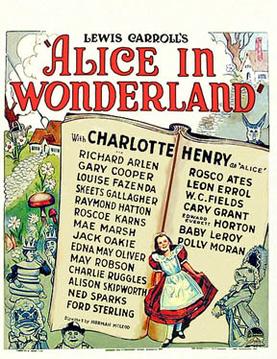
Alice in Wonderland is a 1933 American pre-Code fantasy film adapted from the novels by Lewis Carroll. The film was produced by Paramount Pictures, featuring an all-star cast. It is all live action, except for the Walrus and The Carpenter sequence, which was animated by Harman-Ising Studio.
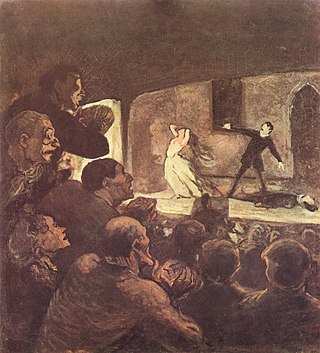
A modern melodrama is a dramatic work in which the plot, typically sensationalized and for a strong emotional appeal, takes precedence over detailed characterization. Melodramas typically concentrate on dialogue that is often bombastic or excessively sentimental, rather than action. Characters are often flat, and written to fulfill stereotypes. Melodramas are typically set in the private sphere of the home, focusing on morality and family issues, love, and marriage, often with challenges from an outside source, such as a "temptress", a scoundrel, or an aristocratic villain. A melodrama on stage, filmed, or on television is usually accompanied by dramatic and suggestive music that offers cues to the audience of the drama being presented.

Theater in the United States is part of the old European theatrical tradition and has been heavily influenced by the British theater. The central hub of the American theater scene is Manhattan, with its divisions of Broadway, Off-Broadway, and Off-Off-Broadway. Many movie and television stars have gotten their big break working in New York productions. Outside New York, many cities have professional regional or resident theater companies that produce their own seasons, with some works being produced regionally with hopes of eventually moving to New York. U.S. theater also has an active community theater culture, which relies mainly on local volunteers who may not be actively pursuing a theatrical career.
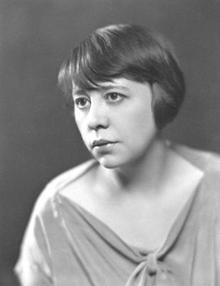
Zoe Byrd Akins was an American playwright, poet, and author. She won the 1935 Pulitzer Prize for drama for The Old Maid.

William Clyde Fitch was an American dramatist, the most popular writer for the Broadway stage of his time.

Margaret Ayer Barnes was an American playwright, novelist, and short-story writer. She was awarded the Pulitzer Prize.
This is a list of bestselling novels in the United States in the 1900s, as determined by The Bookman, a New York-based literary journal. The list features the most popular novels of each year from 1900 through 1909.

Janice Meredith, also known as The Beautiful Rebel, is a silent film starring Marion Davies, released in 1924 and based on the book and play of the same name written by Paul Leicester Ford and Edward Everett Rose. The play opened at the end of 1900 and was the first starring vehicle for stage actress Mary Mannering. The movie follows the actions of Janice Meredith, who helps George Washington and Paul Revere during the American Revolutionary War.
Martin Gerald Sherman is an American dramatist and screenwriter best known for his 20 stage plays which have been produced in over 60 countries. He rose to fame in 1979 with the production of his play Bent, which explores the persecution of homosexuals during the Holocaust. Bent was a Tony nominee for Best Play in 1980 and won the Dramatists Guild's Hull-Warriner Award. It was adapted by Sherman for a major motion picture in 1997 and later by independent sources as a ballet in Brazil. Sherman is an openly gay Jew, and many of his works dramatize "outsiders," dealing with the discrimination and marginalization of minorities whether "gay, female, foreign, disabled, different in religion, class or color." He has lived and worked in London since 1980.

Owen Gould Davis was an American dramatist known for writing more than 200 plays and having most produced. In 1919, he became the first elected president of the Dramatists Guild of America. He received the 1923 Pulitzer Prize for Drama for his play Icebound, His plays and scripts included works for radio and film.

Trelawny of the "Wells" is an 1898 comic play by Arthur Wing Pinero. It tells the story of a theatre star who attempts to give up the stage for love, but is unable to fit into conventional society.

Edward Rose was an English playwright, best known for his adaptations of novels for the stage, mainly The Prisoner of Zenda. He was also the theatre critic for The Sunday Times.

The Golden Age of Indiana Literature is a period between 1880 and 1920, when many nationally and internationally acclaimed literary works were created by natives of the state of Indiana. During this time, many of the United States' most popular authors came from Indiana. Maurice Thompson, George Ade, Booth Tarkington, Theodore Dreiser, Edward Eggleston, Frank McKinney Hubbard, George Barr McCutcheon, Meredith Nicholson, Gene Stratton Porter, Lew Wallace, and James Whitcomb Riley were foremost among the Hoosier authors.
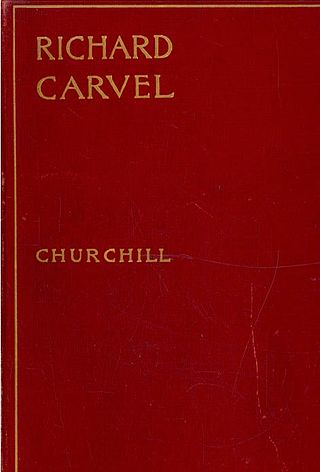
Richard Carvel is a historical novel by the American novelist Winston Churchill. It was first published in 1899 and was exceptionally successful, selling around two million copies and making the author a rich man. The novel takes the form of the memoirs of an eighteenth-century gentleman, the Richard Carvel of the title, and runs to eight volumes. It is set partly in Maryland and partly in London, England, during the American revolutionary era

David Harum is a 1915 American silent comedy-drama romance film written and directed by Allan Dwan, produced by Famous Players Film Company and distributed by Paramount Pictures. It is based on the 1899 novel of the same name by Edward Noyes Westcott and the 1900 Broadway play based on the novel, starring William H. Crane. Crane agreed to star in the film only if the film was written exactly as the play. David Harum is the only film of Dwan's for Famous Players that still survives. A print is preserved at the George Eastman House in Rochester, New York and the Cinémathèque Française in Paris.
This is a list of bestselling novels in the United States from 1895 through 1899, as determined by The Bookman, a New York–based literary journal. Without the international copyright law which came into force in 1891, these volumes could have been printed and published by anyone, the change in this state of affairs made it possible to compile accurate sales figures.
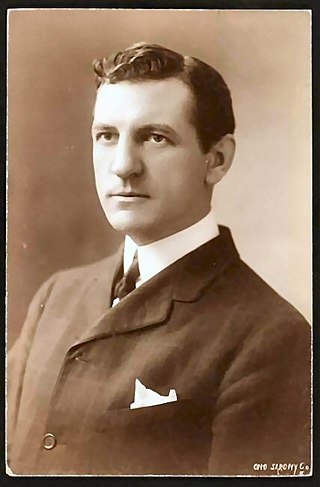
Guy Bates Post was an American character actor who appeared in at least 21 Broadway plays and 25 Hollywood films over a career that spanned more than 50 years. He was perhaps best remembered in the role of Omar Khayyám in the 1914 stage and 1922 film productions of Richard Walton Tully's Omar the Tentmaker and for his over 1,500 performances in John Hunter Booth's 1917 play The Masquerader.

Eben Holden: A Tale of the North Country is a 1900 novel by Irving Bacheller. It was a popular book at the time of its release, among the top 10 bestselling books in the United States in both 1900 and 1901. The book is set in the North Country region of New York.
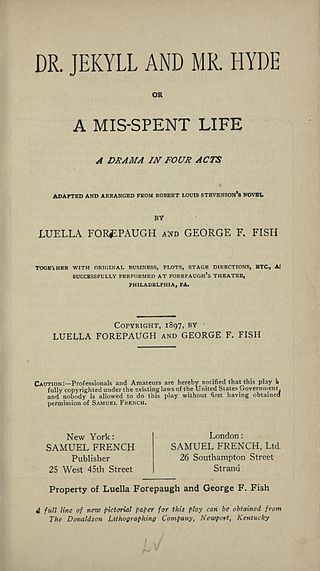
Dr. Jekyll and Mr. Hyde, Or a Mis-Spent Life is a four-act play written in 1897 by Luella Forepaugh and George F. Fish. It is an adaptation of Strange Case of Dr Jekyll and Mr Hyde, an 1886 novella written by the Scottish author Robert Louis Stevenson. The story focuses on Henry Jekyll, a respected London doctor, and his involvement with Edward Hyde, a loathsome criminal. After Hyde murders a vicar, Jekyll's friends suspect he is helping the killer, but the truth is that Jekyll and Hyde are the same person. Jekyll has developed a potion that allows him to transform himself into Hyde and back again. When he runs out of the potion, he is trapped in his Hyde form and commits suicide.
The Master Thief is a mystery play based on a story by Richard Washburn Child, dramatized by playwright E. E. Rose. It has sixteen speaking roles.
References
- ↑ Briscoe, Johnson. The Actor's Birthday Book, Second Series, p. 51 (1908)
- ↑ (3 December 1901). Alice of Old Vicennes: Miss Harned Does Good Acting in an Ordinary Play, The New York Times
- ↑ Los Angeles Herald, Volume 604, Number 8, 8 October 1899, p.13
- ↑ Flom, Eric L., “Silent Film Stars on the Stages of Seattle: A History of Performances by Hollywood Notables,” McFarland & Company, Inc., Jefferson, North Carolina, 2009, ISBN 978-0-7864-3908-9, pages 155-156.
- ↑ Flom, Eric L. (5 March 2009). Silent Film Stars on the Stages of Seattle: A History of Performances by Hollywood Notables. ISBN 9780786439089.
- ↑ (3 April 1939). EDWARD E. ROSE, 77, PLAYWRIGHT, IS DEAD; Dramatized 'Janice Meredith,' 'Richard Carvel,' 'David Harum', The New York Times
- ↑ (16 April 1997). The Date of the Rose, Stanstead Journal